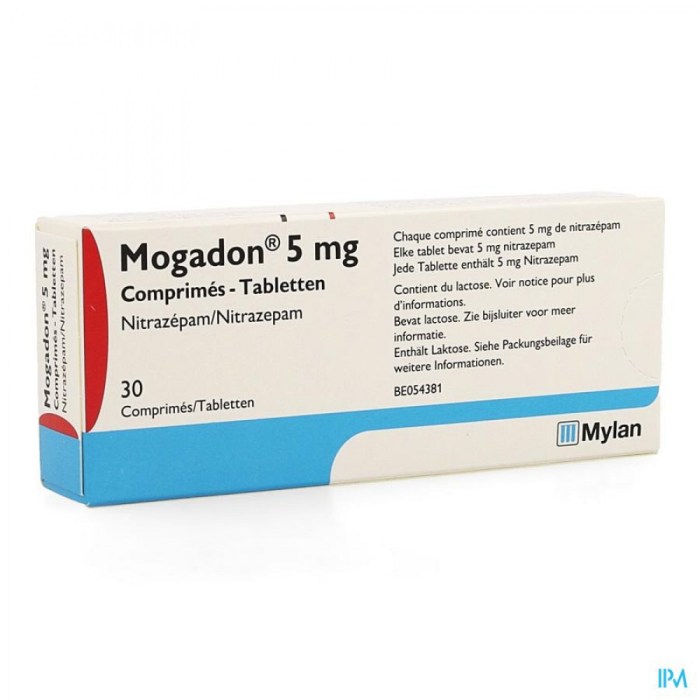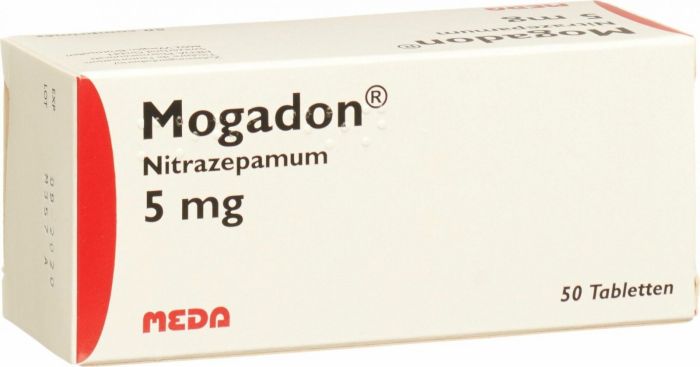Mogadon, a benzodiazepine medication, has played a significant role in the treatment of sleep and anxiety disorders for decades. Its discovery and subsequent introduction to the market marked a turning point in the management of these conditions, offering a new avenue for relief from insomnia, anxiety, and related ailments. However, with the passage of time, the understanding of Mogadon’s mechanisms of action, its therapeutic applications, and potential adverse effects has evolved. This comprehensive exploration delves into the historical context of Mogadon, examines its pharmacological properties, and explores its impact on both individual patients and society as a whole.
From its initial development to its current regulatory status, Mogadon’s journey has been marked by scientific advancements, evolving medical practices, and a growing awareness of its potential benefits and risks. This exploration aims to provide a balanced perspective on Mogadon, shedding light on its past, present, and future in the context of contemporary healthcare.
Mogadon: Alternatives and Future Directions

Mogadon, also known as nitrazepam, has been a mainstay in the treatment of insomnia for decades. However, its potential for dependence and abuse has led to a growing interest in alternative treatments. This section explores alternative approaches to managing insomnia and anxiety, examines ongoing research in the field, and contemplates the future of Mogadon in healthcare.
Alternative Treatments for Insomnia and Anxiety, Mogadon
Non-benzodiazepine medications offer a safer alternative to Mogadon for managing insomnia and anxiety. These alternatives work by targeting different receptors in the brain, resulting in fewer side effects and a lower risk of dependence.
- Non-benzodiazepine hypnotics: These medications, such as zolpidem (Ambien), zaleplon (Sonata), and eszopiclone (Lunesta), are effective for short-term treatment of insomnia. They act on specific GABA receptors in the brain, promoting sleep without the same level of sedation as benzodiazepines.
- Antidepressants: Certain antidepressants, like trazodone and mirtazapine, are sometimes prescribed for insomnia, particularly when anxiety or depression is a contributing factor. These medications can improve sleep quality by increasing serotonin levels in the brain.
- Melatonin: Melatonin is a naturally occurring hormone that regulates sleep-wake cycles. Over-the-counter melatonin supplements can be helpful for individuals with insomnia, especially those with delayed sleep-wake phase disorder.
- Cognitive Behavioral Therapy for Insomnia (CBT-I): CBT-I is a non-pharmacological approach that teaches individuals healthy sleep habits and addresses underlying thoughts and behaviors that contribute to insomnia. It has been proven effective in improving sleep quality and reducing reliance on medication.
- Lifestyle Modifications: Making changes to lifestyle habits, such as regular exercise, maintaining a consistent sleep schedule, creating a relaxing bedtime routine, and avoiding caffeine and alcohol before bed, can significantly improve sleep quality.
Ongoing Research on New Medications and Therapies for Sleep Disorders
The field of sleep medicine is constantly evolving, with ongoing research exploring new medications and therapies for sleep disorders.
- Orexin Receptor Antagonists: These medications, such as suvorexant (Belsomra), target orexin receptors in the brain, which play a role in wakefulness. They are effective for insomnia and have a lower risk of dependence compared to benzodiazepines.
- Dual Orexin Receptor Antagonists: This new class of medications, such as lemborexant (Dayvigo), combines the effects of two orexin receptor antagonists, potentially leading to more effective sleep induction and maintenance.
- Light Therapy: Light therapy, particularly blue light exposure during the day and red light exposure at night, is being investigated for its potential to regulate circadian rhythms and improve sleep quality.
- Neuromodulation Techniques: Non-invasive techniques like transcranial magnetic stimulation (TMS) and vagus nerve stimulation (VNS) are being explored for their potential to modulate brain activity and improve sleep in individuals with refractory insomnia.
Future of Mogadon and its Potential Role in Healthcare
Given the potential for dependence and abuse, the use of Mogadon is likely to decline in the future. However, it may still have a role in specific situations, such as:
- Palliative Care: Mogadon can be used to manage anxiety and insomnia in patients with terminal illnesses, where other treatments may not be effective.
- Short-Term Use for Severe Insomnia: In cases of severe, acute insomnia that cannot be managed with other therapies, Mogadon may be used for a short period under strict medical supervision.
- Research Purposes: Mogadon continues to be used in research studies to investigate the mechanisms of sleep and anxiety disorders.
Mogadon
Mogadon, also known as nitrazepam, is a benzodiazepine medication primarily prescribed for insomnia. It works by enhancing the effects of GABA, a neurotransmitter that inhibits brain activity, promoting relaxation and sleep. While effective for short-term use, long-term use can lead to dependence and withdrawal symptoms.
Mogadon: Case Studies and Examples
Real-world examples demonstrate Mogadon’s use in various clinical scenarios. This section explores the effectiveness and potential challenges associated with Mogadon therapy in specific patient populations.
Examples of Mogadon Use in Clinical Practice
The following table summarizes real-world examples of Mogadon’s use in clinical practice:
| Scenario | Patient Population | Dosage and Duration | Outcome | Challenges |
|—|—|—|—|—|
| Insomnia | Adults with difficulty falling asleep or staying asleep | 5-10 mg orally before bedtime, for 1-2 weeks | Improved sleep quality, reduced anxiety | Dependence, withdrawal symptoms, daytime drowsiness |
| Anxiety | Individuals with generalized anxiety disorder | 5-10 mg orally daily, for 1-2 weeks | Reduced anxiety levels, improved mood | Dependence, withdrawal symptoms, cognitive impairment |
| Muscle Spasm | Patients with muscle spasms due to various conditions | 5-10 mg orally 3-4 times daily, for 1-2 weeks | Reduced muscle spasms, improved mobility | Dependence, withdrawal symptoms, sedation |
Effectiveness and Challenges of Mogadon Therapy
Mogadon therapy can be effective in addressing insomnia, anxiety, and muscle spasms. However, potential challenges include:
* Dependence and Withdrawal Symptoms: Long-term use can lead to dependence and withdrawal symptoms upon discontinuation.
* Sedation and Drowsiness: Mogadon can cause sedation and drowsiness, impairing daily activities.
* Cognitive Impairment: Mogadon can affect cognitive function, including memory and concentration.
* Interactions with Other Medications: Mogadon can interact with other medications, increasing the risk of adverse effects.
Case Study: Application of Mogadon in a Hypothetical Patient Scenario
A 65-year-old woman presents with insomnia and anxiety. She reports difficulty falling asleep and frequent awakenings during the night, leading to daytime fatigue and irritability. She also experiences anxiety related to her upcoming surgery. The physician prescribes Mogadon 5 mg orally before bedtime for 1 week. After one week, the patient reports improved sleep quality and reduced anxiety levels. However, she experiences mild daytime drowsiness. The physician adjusts the dosage to 2.5 mg orally before bedtime and monitors the patient’s response.
Mogadon

Mogadon, also known by its generic name nitrazepam, is a medication used to treat insomnia. It is a benzodiazepine, a class of drugs that have sedative, hypnotic, and anti-anxiety effects. Mogadon works by enhancing the effects of a neurotransmitter called GABA in the brain. GABA is an inhibitory neurotransmitter, meaning it slows down brain activity. This can help to reduce anxiety and promote sleep.
Patient Information and Resources
Patients seeking information about Mogadon should consult reliable resources to understand its use, potential risks, and alternative treatments.
Here are some reputable sources of information:
- Your doctor or pharmacist: They can provide personalized advice and answer any questions you may have about Mogadon.
- The National Institutes of Health (NIH): The NIH website offers comprehensive information on a wide range of health topics, including medications.
- The Food and Drug Administration (FDA): The FDA website provides information on the safety and effectiveness of medications, including Mogadon.
- The American Academy of Sleep Medicine (AASM): The AASM is a professional organization dedicated to promoting sleep health. Their website offers information on sleep disorders, including insomnia.
Here is a table summarizing key points for patients to understand about Mogadon’s use and potential risks:
| Point | Information |
|---|---|
| Use | Mogadon is used to treat insomnia, a sleep disorder characterized by difficulty falling asleep or staying asleep. |
| Risks | Mogadon can cause side effects such as drowsiness, dizziness, and impaired coordination. It can also be habit-forming and lead to dependence. |
| Interactions | Mogadon can interact with other medications, including alcohol, opioids, and antidepressants. |
| Pregnancy and breastfeeding | Mogadon is not recommended for use during pregnancy or breastfeeding. |
| Withdrawal | Abruptly stopping Mogadon can lead to withdrawal symptoms, such as anxiety, insomnia, and seizures. |
Patients considering using Mogadon or those with questions about their treatment should:
- Discuss their medical history and any potential risks with their doctor.
- Follow their doctor’s instructions carefully, including the dosage and duration of treatment.
- Avoid alcohol and other medications that can interact with Mogadon.
- Be aware of the potential for dependence and seek help if they develop any signs of addiction.
- Explore alternative treatment options for insomnia, such as cognitive behavioral therapy for insomnia (CBT-I) or relaxation techniques.
Mogadon’s legacy is intertwined with the evolving landscape of sleep and anxiety treatments. While its historical significance is undeniable, contemporary approaches to these conditions have expanded to encompass a wider range of therapies, including non-benzodiazepine options. As research continues to unravel the complexities of sleep and anxiety, Mogadon’s role in the treatment armamentarium may continue to evolve. However, understanding its history, mechanisms, and potential risks remains crucial for informed decision-making in healthcare.
Mogadon, a medication commonly prescribed for insomnia, can sometimes have side effects that mimic those of other drugs. One such example is the potential for Mogadon to cause weight gain, a side effect also associated with prednison , a corticosteroid often used to treat inflammatory conditions. However, it’s important to note that Mogadon is not a steroid and its effects on weight are typically less pronounced than those of prednison.